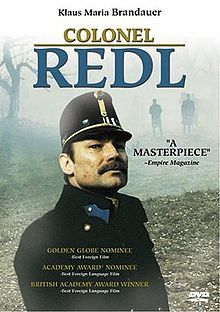- Colonel Redl
-
Colonel Redl 
Directed by István Szabó Written by Péter Dobai Based on A Patriot for Me by
John OsborneStarring Klaus Maria Brandauer Studio Jadran Film
MAFILM
Objektív FilmstúdióDistributed by Orion Pictures (USA) Release date(s) 20 February 1985 (Hungary)
29 March 1985 (West Germany)Country Hungary
Austria
West GermanyLanguage German
HungarianColonel Redl (German: Oberst Redl (original title); Hungarian: Redl ezredes) is a 1985 drama film by Hungarian director István Szabó. It tells the life story of an Austrian Imperial military officer Alfred Redl (played by Klaus Maria Brandauer) who was blackmailed into espionage for the Russian secret service to prevent the revelation of his homosexuality. The screenplay is adapted from British playwright John Osborne's play A Patriot for Me.
Contents
Historical background
Set in the Austro-Hungarian empire in the period before World War I, the film charts the rise of Colonel Redl from a boy at military school, right up to his betrayal, compromise and suicide.
The film also charts the rise of inter-ethnic tensions in Austro-Hungary, which were to bring about the assassination in Sarajevo - Redl is himself a Ruthenian, one of the minor Slavic groups, and ends up suffering because of that.
Redl himself goes from being a fanatical supporter of the Habsburg monarchy, to a pathetic victim, but by that time it is too late for him.
Plot
Redl is an ambitious military officer in pre-World War I Austria whose career path is set early on. Redl's mother wants to restore her family's past glory through her son, and Redl soon wins favor everywhere for his talent, drive and loyalty to the Empire's ideal: tolerance for all and devotion to the Crown. In military school, he's forced to inform on Kubinyi, a student who's the source of a practical joke; though he beats himself up for being a Judas, he soon realizes that to rise in the ranks he must overcome his peasant background and hide his homosexuality by ingratiating himself with his superiors.
Kubinyi is a Hungarian nobleman,and together the two slowly climb the ladder of career-officers. While Kubinyi slowly falls prey to the national aspirations of a Hapsburg-free Hungary, Redl remains faithful to his benefactor, to his raison d'etre. Redl feverishly defends his King and country by working to uncover the various nationalistic movements that threaten the Empire's solidarity. In time, he becomes Chief of Military Intelligence for the Austro-Hungarian empire. His superiors find the perfect servant in Redl. His loyalty to the crown is steadfast, but the parvenus around the aging Emperor sense that Redl is their worst enemy. Nationalism is just one of the many diseases gnawing away at the Empire. The self-interest and greed of the nobles-in-waiting prove to be an even greater danger. As head of counter-intelligence, Redl soon sniffs out the bloody dagger; Austrian and Hungarian aristocrats are planning a coup d'etát with the help of Tsarist Russia. Waiting to catch the guilty conspirators, Redl is caught instead.
Though he professes to hate politics and politicians, Redl also can't avoid them. When the leader for whom Redl is supposedly spying among the officer corps, draws up a list of who can't be exposed for traitorous activities (including Austrian nobles, Hungarians, Czechs, Serbs, Croatians, and even the usual scapegoats, Jews -- the aftershocks of the Dreyfuss affair are still rumbling), he tells Redl that he must find a double of himself, a Ukrainian. His hidden homosexuality becomes known to the court and he is put into a compromising position. Public disgrace with discharge from the service or take the 'more honorable' position of scapegoat that he, Colonel Redl, conspired with the Russians. Disloyalty to himself or disloyalty to the Emperor and Empire---to his new-found father and family? A cruel choice that Redl is forced to make. Now certain that he will be exposed, Redl surrenders to fate, quoting to his wife from Montaigne: "It's no sin to be involved. It's a sin to remain involved." He is put under house arrest and commits suicide with a pistol.
Cast
- Klaus Maria Brandauer as Alfred Redl ezredes
- Hans Christian Blech as von Roden ezredes
- Armin Mueller-Stahl as Trónörökös
- Gudrun Landgrebe as Kubinyi Katalin
- Jan Niklas as Kubinyi Kristóf
- László Mensáros as Ruzitska ezredes
- András Bálint as Dr. Gustav Sonnenschein
- László Gálffi as Alfredo Velocchio
- Dorottya Udvaros as Clarissa
- Károly Eperjes as Jaromil Schorm hadnagy
- Róbert Rátonyi as Ullmann báró
Awards
The film won the BAFTA Award for Best Foreign Language Film. It was nominated for an Academy Award for Best Foreign Language Film, but lost to The Official Story.
It won the Jury Prize at the 1985 Cannes Film Festival.[1]
References
- ^ "Festival de Cannes: Colonel Redl". festival-cannes.com. http://www.festival-cannes.com/en/archives/ficheFilm/id/945/year/1985.html. Retrieved 2009-06-28.
External links
- Colonel Redl at the Internet Movie Database
- Colonel Redl at AllRovi
- Colonel Redl at Rotten Tomatoes
- Colonel Redl at Box Office Mojo
Awards Preceded by
no award 1984
Kharij (1983)Jury Prize, Cannes
1985Succeeded by
ThérèseFeature Films Directed by István Szabó Age of Illusions (1964) · Father (1966) · Lovefilm (1970) · 25 Fireman Street (1973) · Budapest Tales (1976) · Bizalom (1980) · Der grüne Vogel (1980) · Mephisto (1981) · Colonel Redl (1985) · Hanussen (1988) · Meeting Venus (1991) · Sweet Emma, Dear Böbe (1992) · Sunshine (1999) · Taking Sides (2001) · Being Julia (2004) · Rokonok (2006)Categories:- 1985 films
- Hungarian films
- Austrian films
- German-language films
- Hungarian-language films
- 1980s drama films
- Films directed by István Szabó
- Hungarian LGBT-related films
Wikimedia Foundation. 2010.
